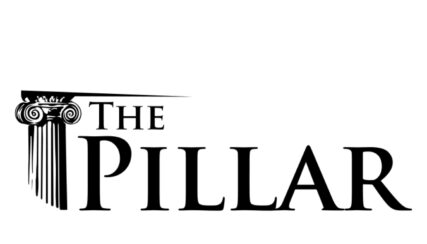(RNS) — When a conservative newsletter called The Pillar published a story last week alleging to have cellphone data indicating that Monsignor Jeffrey Burrill, a high-ranking official at the U.S. Conference of Catholic Bishops, used the hookup app Grindr, many in the media, tech and religion world wanted to know just how they did it, and whether it was ethical.
But another, equally common question was: What is The Pillar?
The short answer: The Pillar is a Catholic publication founded at the beginning of this year on the Substack platform, a popular subscription newsletter service that has attracted an array of high-profile writers (and, in turn, an array of criticism).
But upon closer inspection, The Pillar is a bit more complicated: It’s an outlet that appears to be simultaneously expressive of a new era of journalism and an emboldened form of conservative Catholicism.
The Pillar’s founders — J.D. Flynn and Ed Condon — are alumni of the Catholic News Agency. Flynn served as CNA’s editor-in-chief (a role he now fills at The Pillar), while Condon worked as CNA’s Washington editor.
CNA, in turn, is owned by Eternal Word Television Network, better known as EWTN, an Alabama-based spiritual-network-turned-conservative-Catholic-media-empire that now boasts reporters in the White House press room and includes among its holdings the National Catholic Register.
Both Flynn and Condon are also canon lawyers — specialists in Catholic Church law. Flynn previously worked at the Archdiocese of Denver and the Diocese of Lincoln, while Condon, according to The Pillar’s website, “spent nearly ten years working in professional politics in the United Kingdom.”
Their work at CNA sometimes came under scrutiny, with critics raising questions about their use of anonymous sources. One account penned by Flynn (with Condon listed as a contributor) cited anonymous bishops who, after attending a confab with other bishops and Pope Francis, claimed the pontiff felt “used” after widespread media coverage of his meeting with the Rev. James Martin, a Jesuit who advocates for better treatment of LGBTQ people by the church. Two bishops later publicly contradicted the anonymous bishop’s quote.
Martin told Religion News Service this week that the day after the CNA story was published, a message from Francis was forwarded to him in which the pontiff expressed “how much he enjoyed our meeting.” Francis has since sent Martin a letter praising his work.
Flynn and Condon resigned from CNA in December 2020, founding The Pillar together shortly thereafter.
Their jump to Substack was not unique: The platform’s list of recent converts includes Vox co-founder and columnist Matt Yglesias and pundit Andrew Sullivan. The Pillar, which lists a four-person staff, does not say on its website whether it is funded entirely through subscriptions, is underwritten by a benefactor or both.
Flynn did not respond to requests from RNS to discuss the outlet’s founding.
In The Pillar’s inaugural post on Jan. 1, Flynn declared the organization would strive to represent “good reporting” that “assumes that people deserve the facts, unvarnished and without spin, in order to make judgments about real things that matter in their lives.” He also asserted that the Pillar “won’t create narratives of polemics, sensationalism, or self-aggrandizement” because readers “care about the facts, not our opinions.”
Critics argue its article last week abandoned those lofty standards. One writer at Recode lambasted The Pillar for “inaccurately conflat(ing) homosexuality and dating app usage with pedophilia,” an accusation Flynn and Condon have refuted.
The story has also been widely condemned for its use of de-anonymized cellphone data, the accuracy of which remains an open question. Grindr initially released a statement calling The Pillar’s findings “infeasible from a technical standpoint,” but later updated its statement to say “We do not believe Grindr is the source of the data.”
Regardless of its accuracy, Todd Gitlin, a professor of journalism at Columbia University’s Journalism School, termed The Pillar’s story “scummy” in an email sent to the National Catholic Reporter.
Irina Raicu, who directs the Internet Ethics Program at Santa Clara University’s Markkula Center for Applied Ethics, championed the priest’s right to privacy, even in the face of alleged hypocrisy surrounding the use of Grindr after taking a vow of celibacy and working for an employer that opposes homosexuality and unmarried sex.
“Do hypocritical people deserve privacy? Are there any people that we think just don’t deserve privacy? I don’t believe so,” Raicu said. “For reasons having to do with human dignity and autonomy, and for the fact that we are now so connected and networked, if you think you are targeting one person, you may well be harming many people around them as well.”
Raicu added that such issues are nonetheless complex, arguing that privacy is not an absolute right and must be balanced against other rights.
The day before The Pillar’s report was published, CNA released its own story under the headline “Concerns raised about using surveillance technology to track clergy,” revealing that CNA had been approached in 2018 by “a person concerned with reforming the Catholic clergy” who “claimed to have access to technology capable of identifying clergy and others who download popular ‘hook-up’ apps, such as Grindr and Tinder, and to pinpoint their locations using the internet addresses of their computers or mobile devices.”
CNA editor Alejandro Bermudez said his outlet declined the offer. It is unclear whether CNA believed The Pillar’s dataset was the same as the data presented to CNA.
In a podcast, Flynn and Condon noted that cell phone users typically consent to sharing their data with tech companies when opening apps. Privacy advocates have long challenged the process by which tech companies gain that consent, but Flynn and Condon were dismissive of such arguments, suggesting users are at fault for failing to read terms and conditions statements.
After the article was published, Flynn posted to Twitter that when it came to “the balance between individual privacy and public interest,” Pillar staff were “confident in (their) deliberation.”
The Pillar has published two additional stories that appeared to tease forthcoming reports regarding officials at the Archdiocese of Newark and the Vatican.
Flynn did note “there was no indication, at all” that Burrill used Grindr for illegal purposes, but defended connecting the app to pedophilia, insisting that “location-based hookup apps pose risk of both intentional and unintentional exploitation and abuse of minors.”
Meanwhile, others have also raised the question of how The Pillar’s story could impact LGBTQ people — particularly those in countries where LGBTQ individuals face prosecution or persecution.
“The linking in people’s minds of homosexuality and pedophilia leads to this witch hunt,” said Martin. “What people don’t realize is that this may be just the beginning. Why not target Catholic school principals who are married? Why not look at the data of parishioners to see if they’re worthy of receiving Communion?”
Martin told RNS that since he tweeted about the The Pillar story, he personally has received harassment on Twitter — “you’re going to burn in Hell” and “getting nervous, Jimmy?” — and raised concerns LGBTQ Catholics could soon experience the same.
This story has been updated to further detail Irina Raicu’s understanding of the right to privacy.








